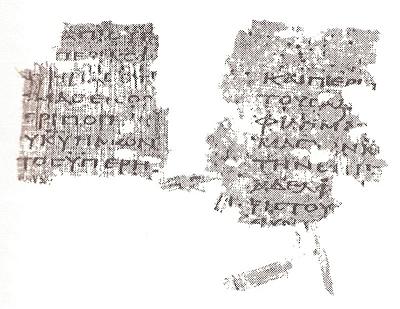| Change to Book/Chapter View |
|
|
|
Translation process is ongoing. For current status see details |
|
|

Papyrus 30 Date: Early Third Century A.D. Discovered: Oxyrhynchus, Egypt Location: Ghent, Belgium: Rijksuniversiteit, Univ. Bibliotheek Contents: 1 Thessalonians 4:12-13,16-17; 5:3, 8-10, 12-18, 25-28; 2 Thessalonians 1:1-2, 2:1, 9-11
1 Thessalonians 4 12 that you may walk properly toward those who are outside, and may have need of nothing. 13 But we don’t want you to be ignorant, brothers, concerning those who have fallen asleep, so that you don’t grieve like the rest, who have no hope. [..] 16 For the Lord himself will descend from heaven with a shout, with the voice of the archangel and with God’s trumpet. The dead in Christ will rise first, 17 then we who are alive, who are left, will be caught up together with them in the clouds, to meet the Lord in the air. So we will be with the Lord forever. [..]
1 Thessalonians 5 [..] 3 For when they are saying, “Peace and safety,” then sudden destruction will come on them, like birth pains on a pregnant woman. Then they will in no way escape. [..] 8 But since we belong to the day, let’s be sober, putting on the breastplate of faith and love, and for a helmet, the hope of salvation. 9 For God didn’t appoint us to wrath, but to the obtaining of salvation through our Lord Jesus Christ, 10 who died for us, that, whether we wake or sleep, we should live together with him. [..] 12 But we beg you, brothers, to know those who labor among you, and are over you in the Lord, and admonish you, 13 and to respect and honor them in love for their work’s sake. Be at peace among yourselves. 14 We exhort you, brothers: Admonish the disorderly; encourage the faint-hearted; support the weak; be patient toward all. 15 See that no one returns evil for evil to anyone, but always follow after that which is good for one another and for all. 16 Always rejoice. 17 Pray without ceasing. 18 In everything give thanks, for this is the will of God in Christ Jesus toward you. [..] 25 Brothers, pray also[i] for us. 26 Greet all the brothers with a holy kiss. 27 I solemnly command you by the Lord that this letter be read to all the holy brothers. 28 The grace of our Lord Jesus Christ be with you. Amen.
2 Thessalonians 1 Paul, Silvanus, and Timothy, to the assembly of the Thessalonians in God our Father, and the Lord Jesus Christ: 2 Grace to you and peace from God our Father and the Lord Jesus Christ. [..] 2 Thessalonians 2 Now, brothers, concerning the coming of our Lord Jesus Christ and our gathering together to him, we ask [..] 9 even he whose coming is according to the working of Satan with all power and signs and lying wonders, 10 and with all deception of wickedness for those who are being lost, because they didn’t receive the love of the truth, that they might be saved. 11 Because of this, God sends them a working of error, that they should believe a lie; |
How to read these pages: • The
translation to the left is based on the World English Bible. Words in regular
black font are words in the manuscript matching the Majority Text for that
passage. • Words
in italics cannot be seen in the manuscript, since the manuscript is
fragmentary. These words are supplied for readability by the World English
Bible translation. • Words
present in the manuscript but with some letters unreadable or missing are in blue
like this: blue. One Greek word often is
translated into multiple English words, and when this occurs, all the English
words are in blue. • Words
present in the manuscript but with spelling or trivial word order differences that do not affect the
meaning are in green like this: green. • If
the manuscript is different from the Majority Text, words in the Majority
Text that are missing from the text of the manuscript are marked through in red
like this: • If the manuscript is different from the Majority Text, words in the manuscript that are not in the Majority Text are underlined in red like this: new words.If the manuscript differs from the Majority Text yet matches another well-known text, this is noted in the footnotes.
|
